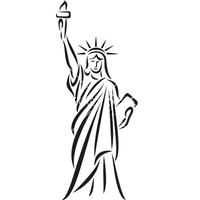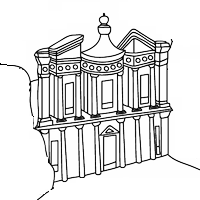Mohandas Karamchand Gandhi was born on 2 October 1869 in Porbandar in the state of Gujarat. He comes from the caste of Vayshia and his family is relatively wealthy. As a child, his mother inculcates Hindu values, but he also learns about other religions and tolerates them. It is doubtless during this period that the moral convictions of Gandhi are forged.
According to the customs of his caste, his family married him at 14 years with Kasturbai who will remain his wife all his life. Growing up Gandhi becomes convinced that he will only be someone by breaking with the customs of India and copying the lifestyle of the English. So it is logical that he embarked for England in 1888 leaving wife and child to study law.

It is paradoxically in London that Gandhi reads the main texts of Hinduism, notably the Baghavad-Gita, which will influence him deeply. He also discovers the life of Buddha, Jesus, Mohammed and makes the acquaintance of the English theosophists.
After three years in England and law degree in his pocket, Gandhi returned to India. Unfortunately, his professional life is stalled and he remains torn between his Hindu roots and his attraction to the Western bourgeoisie. In 1893 an Indian company proposed to him to go to South Africa to defend his interests during a trial. Gandhi agrees. He does not know it yet, but it is the turning point of his life.
Upon his arrival there he is confronted with racial discrimination. Expelled from a train he quickly realized that the British and the Boers dominated undivided Black and immigrant populations (at that time 100,000 Indians live in South Africa). He is shocked to see that the subjects of the British Empire are not treated in the same manner according to the color of their skin.

In 1894, after the trial, won, for which he had come, Gandhi decides to fight against a law to prohibit the Indians the right to elect representatives to the assembly of the state of Natal. He has a petition signed to 10,000 people and gets the bill withdrawn. Gandhi had above all succeeded in making the Indians realize that it was necessary to unite. Gandhi decides to continue the fight. In 1896 he sought his wife and children in India and returned to South Africa. He worked as a lawyer until 1899. The Boer War broke out and Gandhi called his compatriots to support the English.
In 1906 a new segregationist law was passed at the Transvall. It enjoins Asian women to register on lists to monitor their activities. Gandhi succeeded in convincing 3,000 delegates not to submit to the new law and to resist whatever the cost, but without violence. Gandhi is arrested and jailed for six months. In 1909 he published "Hind Swaraj", a book in which he develops the theories of combat by non-violence: the satyagraha.
For eight years, Gandhi will continue to oppose segregationist laws and General Smuts which will earn him further stays in prison. Finally, June 30, 1914, Smuts and Gandhi signed an agreement on the repeal of a large part of the racial laws. July 18, 1914 Gandhi leaves South Africa for ever and returns to India.
On his return, he decides to go and discover his native land. His journey lasted one year at the end of which he established an ashram near Ahmedabad. His name is now associated with the struggle against injustice. That is why, in early 1917, Gandhi went to Bihar at the call of the indigo farmers exploited shamelessly by the English industrialists. Given the risks of riots, the government gives satisfaction to the planters.
Hardly returned to Ahmedabad, Gandhi supports a strike of textile workers and uses, for the first time, fasting to put pressure on the bosses and to show his full solidarity with the strikers.
At the end of the First World War, during which Gandhi had called for the support of the war effort, he presented to the British his first claims of autonomy for India. On 6 April 1919, to impress the English, Gandhi called on the people to publicly demonstrate throughout the country and to cease all activity. The event is a huge success. On April 13, in Amritsar, the population again demonstrated despite the ban. General Dyer then ordered his men to fire on the peaceful crowd. The result is appalling: more than 300 dead and more than 1000 injured. Horrified, Gandhi immediately suspends the satyagraha.

In 1920 he reconsidered his means of action. Supported by the Congress party and the Muslims, he called for non-cooperation with the British administration and called for a boycott of textile products of European origin. The whole of India is moving and the tension continues to mount. Many leaders are imprisoned and clashes take place. During one of them 22 policemen are lynched by the crowd. The Mahatma, as it is now called, decides to put an end to all action.
He was arrested and sentenced to six years in prison. He will remain imprisoned for 2 years during which the movement will run out of steam.
On his release from prison Gandhi calls for national cohesion and demands social equality for the untouchables he affectionately calls the harijans ("children of God"). He will also lead two hunger strikes so that they can enter the temples.
In the early 1930s, Gandhi regained all his enthusiasm. He has considerable influence. At each of its slogans India stops. On 12 March 1930 the Mahatma undertook his most famous action: the march of salt. Its objective is to denounce the English monopoly of the sale of salt. For 24 days and over 350 km the procession will not stop inflating. Arrived at his goal Gandhi picks up a handful of salt and announces that he begins civil disobedience. He is arrested again.
In January 1931 the Vice-King Lord Irving had him released. He exchanges the release of political prisoners and the end of the salt laws against the end of civil disobedience and Gandhi's participation in a conference in London. This one accepts and takes the opportunity to visit Europe. This round table will not be followed by any significant change in Indian policy, especially as Churchill comes to power with the intention of crushing the Congress Party. Thousands of militants are soon arrested.
In August 1932 Gandhi was thrown into prison. Disputes between communities are getting worse and the rights of untouchables are threatened. On September 20, the Mahatma went on a new hunger strike. The British government is bending at the threat of Gandhi's death, which has become very popular in Europe.
In 1934 Gandhi withdrew from politics as such, preferring to leave it to the young congressional leaders including Nehru. On the other hand, he continues to fight for cohesion between the communities and for the education of the masses, which will earn him the enmity of the Hindu extremists. That year, Gandhi escaped the first of five assassination attempts.
In the elections of 1937, the Congress obtained an overwhelming majority in the Indian parliament. From then on, the march towards autonomy and independence seems inescapable.
When the Second World War broke out in 1939, Gandhi refused to join the British. He says that only an independent India could contribute to the fight against the Nazis. In 1942 he even launched his famous slogan "Quit India". He enjoined the British to leave as quickly as possible and re-launched the civil disobedience movement. He and the leaders of the Congress are arrested after riots broke out. His wife Kasturbai died during his detention. In 1944 Churchill made him free.

After the war the Atlee Labor Party came to power in England. The Prime Minister is determined to complete the independence process. Lord Mountbatten is appointed Viceroy with this mission. This is when the Muslim and Hindu communities are torn apart. The Muslim League of Mohammed Ali Jinnah continues to demand the creation of an independent state with a Muslim majority.
Gandhi, on the other hand, remains attached to the unity of India more than anything else. Jinnah refuses to participate in the provisional government of Nehru and calls for a day of insurrection on August 16, 1946. It results in thousands of deaths including at least 5,000 in Calcutta.
Gandhi uses all his influence to avoid partition but on August 15, 1947 Lord Mountbatten announces the independence of two new nations: Pakistan and India.
We are witnessing the murderous exodus of several million people. Sacks, murders, settlements of all kinds will make between one and two million victims. Terrified by the situation, especially in Calcutta, Gandhi decides to fast until death. Nehru then does everything in his power to put an end to the massacres. He succeeds in this, and Gandhi feeds again. Yet the anger of the extremists has not fallen. Those of the Hindu side, in particular, hold Gandhi to account for his too great gentleness towards the Muslims.
On January 30, 1948, one of them, Nathuram Godse, defeated him in Delhi. "He Ram" will be the last words of the Father of the Nation.
His death provokes an international emotion. In Delhi more than two million Indians will attend his national funeral.

Today, Gandhi's imprint is still alive in India, even if the fair, egalitarian and non-violent society he had dreamed of remains to be built.
See also:



















